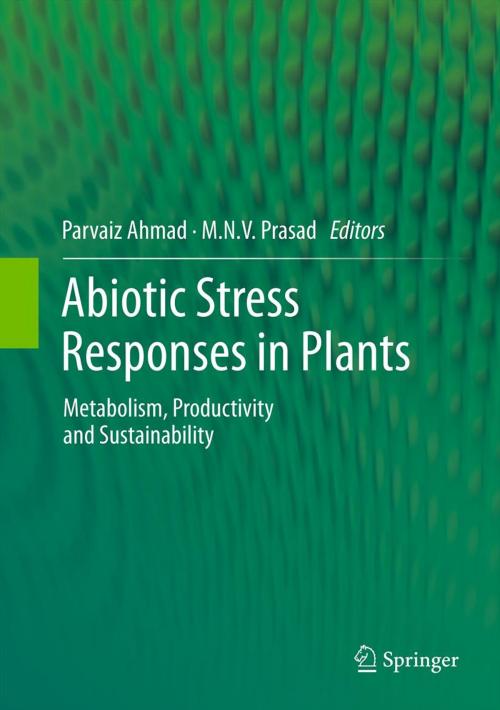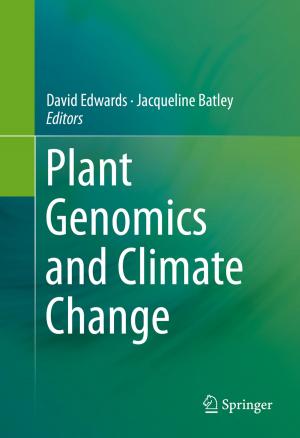Abiotic Stress Responses in Plants
Metabolism, Productivity and Sustainability
Nonfiction, Science & Nature, Science, Biological Sciences, Biochemistry, Botany| Author: | ISBN: | 9781461406341 | |
| Publisher: | Springer New York | Publication: | November 16, 2011 |
| Imprint: | Springer | Language: | English |
| Author: | |
| ISBN: | 9781461406341 |
| Publisher: | Springer New York |
| Publication: | November 16, 2011 |
| Imprint: | Springer |
| Language: | English |
Abiotic stress cause changes in soil-plant-atmosphere continuum and is responsible for reduced yield in several major crops. Therefore, the subject of abiotic stress response in plants - metabolism, productivity and sustainability - is gaining considerable significance in the contemporary world. Abiotic stress is an integral part of “climate change,” a complex phenomenon with a wide range of unpredictable impacts on the environment. Prolonged exposure to these abiotic stresses results in altered metabolism and damage to biomolecules. Plants evolve defense mechanisms to tolerate these stresses by upregulation of osmolytes, osmoprotectants, and enzymatic and non-enzymatic antioxidants, etc. This volume deals with abiotic stress-induced morphological and anatomical changes, abberations in metabolism, strategies and approaches to increase salt tolerance, managing the drought stress, sustainable fruit production and postharvest stress treatments, role of glutathione reductase, flavonoids as antioxidants in plants, the role of salicylic acid and trehalose in plants, stress-induced flowering. The role of soil organic matter in mineral nutrition and fatty acid profile in response to heavy metal stress are also dealt with. Proteomic markers for oxidative stress as a new tools for reactive oxygen species and photosynthesis research, abscisic acid signaling in plants are covered with chosen examples. Stress responsive genes and gene products including expressed proteins that are implicated in conferring tolerance to the plant are presented. Thus, this volume would provides the reader with a wide spectrum of information including key references and with a large number of illustrations and tables.
Dr. Parvaiz is Assistant Professor in Botany at A.S. College, Srinagar, Jammu and Kashmir, India. He has completed his post-graduation in Botany in 2000 from Jamia Hamdard New Delhi India. After his Ph.D from the Indian Institute of Technology (IIT) Delhi, India in 2007 he joined the International Centre for Genetic Engineering and Biotechnology, New Delhi. He has published more than 20 research papers in peer reviewed journals and 4 book chapters. He has also edited a volume which is in press with Studium Press Pvt. India Ltd., New Delhi, India. Dr. Parvaiz is actively engaged in studying the molecular and physio-biochemical responses of different plants (mulberry, pea, Indian mustard) under environmental stress.
Prof. M.N.V. Prasad is a Professor in the Department of Plant Sciences at the University of Hyderabad, India. He received B.Sc. (1973) and M.Sc. (1975) degrees from Andhra University, India, and the Ph.D. degree (1979) in botany from the University of Lucknow, India. Prasad has published 216 articles in peer reviewed journals and 82 book chapters and conference proceedings in the broad area of environmental botany and heavy metal stress in plants. He is the author, co-author, editor, or co-editor for eight books. He is the recipient of Pitamber Pant National Environment Fellowship of 2007 awarded by the Ministry of Environment and Forests, Government of India.
Abiotic stress cause changes in soil-plant-atmosphere continuum and is responsible for reduced yield in several major crops. Therefore, the subject of abiotic stress response in plants - metabolism, productivity and sustainability - is gaining considerable significance in the contemporary world. Abiotic stress is an integral part of “climate change,” a complex phenomenon with a wide range of unpredictable impacts on the environment. Prolonged exposure to these abiotic stresses results in altered metabolism and damage to biomolecules. Plants evolve defense mechanisms to tolerate these stresses by upregulation of osmolytes, osmoprotectants, and enzymatic and non-enzymatic antioxidants, etc. This volume deals with abiotic stress-induced morphological and anatomical changes, abberations in metabolism, strategies and approaches to increase salt tolerance, managing the drought stress, sustainable fruit production and postharvest stress treatments, role of glutathione reductase, flavonoids as antioxidants in plants, the role of salicylic acid and trehalose in plants, stress-induced flowering. The role of soil organic matter in mineral nutrition and fatty acid profile in response to heavy metal stress are also dealt with. Proteomic markers for oxidative stress as a new tools for reactive oxygen species and photosynthesis research, abscisic acid signaling in plants are covered with chosen examples. Stress responsive genes and gene products including expressed proteins that are implicated in conferring tolerance to the plant are presented. Thus, this volume would provides the reader with a wide spectrum of information including key references and with a large number of illustrations and tables.
Dr. Parvaiz is Assistant Professor in Botany at A.S. College, Srinagar, Jammu and Kashmir, India. He has completed his post-graduation in Botany in 2000 from Jamia Hamdard New Delhi India. After his Ph.D from the Indian Institute of Technology (IIT) Delhi, India in 2007 he joined the International Centre for Genetic Engineering and Biotechnology, New Delhi. He has published more than 20 research papers in peer reviewed journals and 4 book chapters. He has also edited a volume which is in press with Studium Press Pvt. India Ltd., New Delhi, India. Dr. Parvaiz is actively engaged in studying the molecular and physio-biochemical responses of different plants (mulberry, pea, Indian mustard) under environmental stress.
Prof. M.N.V. Prasad is a Professor in the Department of Plant Sciences at the University of Hyderabad, India. He received B.Sc. (1973) and M.Sc. (1975) degrees from Andhra University, India, and the Ph.D. degree (1979) in botany from the University of Lucknow, India. Prasad has published 216 articles in peer reviewed journals and 82 book chapters and conference proceedings in the broad area of environmental botany and heavy metal stress in plants. He is the author, co-author, editor, or co-editor for eight books. He is the recipient of Pitamber Pant National Environment Fellowship of 2007 awarded by the Ministry of Environment and Forests, Government of India.















